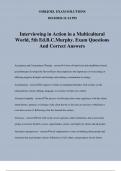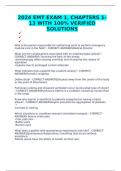©SIRJOEL EXAM SOLUTIONS
10/14/2024 11:14 PM
Interviewing in Action in a Multicultural
World, 5th Ed.B.C.Murphy. Exam Questions
And Correct Answers
Acceptance and Commitment Therapy - answer✔A form of behavioral and mindfulness-based
psychotherapy developed by Steven Hayes that emphasizes the importance of overcoming or
diffusing negative thoughts and feelings and making a commitment to change.
Acculturation - answer✔The degree to which an immigrant identifies with or takes on the
characteristics (food, clothing, language, or customs) of their new culture.
Advanced empathy - answer✔The process of reflecting (after some experience with the client)
about themes, patterns, or feelings of the client that he or she may not yet have verbalized or
even been aware of. Reflecting what lies beneath the surface.
Advocacy - answer✔Work with social service agencies, other institutions, and social action
groups to increase benefits, access, opportunities, justice, and rights for clients and all people.
Alternative perspectives - answer✔Novel explanations or ways of thinking about people and
situations that may broaden clients' definitions of self, others, and prospects for the future.
, ©SIRJOEL EXAM SOLUTIONS
10/14/2024 11:14 PM
Ambivalence - answer✔Having two or more opposing ideas, feelings, or impulses
simultaneously, which often leads to feeling stuck and immobilized.
Amplified reflection - answer✔A non-judgmental but gentle exaggeration of the reason to
sustain behavior in order to evoke the other side of the ambivalence.
Anticipatory empathy - answer✔Before meeting with clients, the clinician thinks about the
information available about the clients, anticipates their feelings and reactions, and adjusts his or
her ways of interacting accordingly.
Anxiety hierarchy - answer✔The cognitive behavioral technique of having the client rate
frightening stimuli on a scale of 1 to 100 in terms of their intensity and psychological power in
the client's life.
ASL interpreters - answer✔American Sign Language interpreters for deaf or hard-of-hearing
people who use a combination of signing, finger spelling, and body language to convey meaning
and tone.
Assertiveness training - answer✔Learning to develop greater self-affirmation and voice through
education, support, and new skills rehearsal to prepare for challenging or formerly
disempowering interactions.
Assessment interviews - answer✔Information gathering conversations that include client self-
reports and the clinician's experience in the interview. Assessment interviews may be
unstructured, semi-structured, or structured.
, ©SIRJOEL EXAM SOLUTIONS
10/14/2024 11:14 PM
Assessment summary - answer✔A psychological report summarizing assessment findings and
case conceptualization.
Assessment tests - answer✔Standardized tests used as part of the assessment process. These can
include intelligence tests, personality tests, neuropsychological tests, symptom checklists, and
other medical tests.
Automatic thoughts - answer✔The concept developed by cognitive behavioral therapists to
describe reflexive and involuntary thoughts and images. Automatic thoughts are often negative.
Aversive racism - answer✔A term describing the thinking and actions of those who espouse
egalitarian values and find racism offensive while being unaware of their own unconscious,
unintentional racist behaviors.
Behavioral rehearsal - answer✔The clinical technique of practicing new behaviors in the safety
of the clinical interview, trying them out with the clinician's feedback and encouragement before
trying them out elsewhere.
Behavioral synchrony - answer✔The participants in a conversation often change their postures,
gestures, and mannerisms to match each other. Behavioral synchrony helps us perceive and
recognize the emotional experience of another, builds rapport, and increases empathy.
Best Possible Self - answer✔A Positive Psychology technique in which the client is asked to
write about what their lives would be like in terms of friends, family, career, etc., if they worked
hard and everything turned out in a positive way.
, ©SIRJOEL EXAM SOLUTIONS
10/14/2024 11:14 PM
Borrowed environment - answer✔Any nonoffice setting or locale adopted for interviewing
purposes.
Brainstorm - answer✔Putting numerous alternative explanations or possibilities on the table for
discussion without judging them as they emerge.
Broaden and build theory - answer✔The idea that positive emotions expand or broaden the scope
of attention and therefore help build personal resources and increase personal well-being.
Bubble of calm - answer✔A circumscribed and focused atmosphere of quiet and safety
conducive to clinical conversation and reflection on the work.
Burnout - answer✔A response to prolonged occupational stress found in those who work in the
helping professions in situations where there is a heavy workload, few rewards, unrealistic
expectations, and little administrative support. Symptoms include irritability, exhaustion,
absence from work.
Case conceptualization - answer✔The integration and analysis of assessment data from which
hypotheses about the person, situation, and possible interventions are based.
Case management - answer✔Coordinating client care from a number of different service
providers.
Central relational paradox - answer✔Asserts that individuals accustomed to invalidation or
rejection often try to connect with others by holding back parts of their experience and feelings
for fear that disclosure of these parts of themselves will lead to more rejection.





